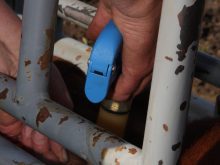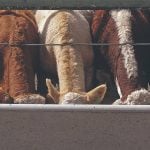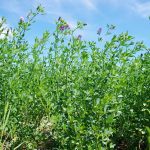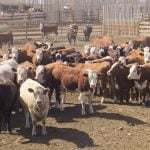Glacier FarmMedia—Efficiency is key when it comes to reducing greenhouse gas emissions in the beef sector, a livestock scientist says.
Sarah Klopatek is the chief livestock scientist at JBS where she focuses on cattle system dynamics and sustainability in livestock. She spoke at the Saskatchewan Beef Industry Conference on January 29 in Saskatoon, Sask.
Frequently, the beef industry is criticized for being bad for the environment. Cattle are well known for the methane they produce and have been under fire for emitting more greenhouse gases than other forms of agriculture.
Read Also

Ample supplies and improved livestock sector to boost Canadian feed sector: FCC
Abundant feed grain supplies and improved profitability for the livestock sector should support strong feed demand and sales through the winter, says a new report from Farm Credit Canada.
However, Klopatek says this isn’t the full story. In total, livestock equal about 4.8 per cent of all direct emissions in Canada, with cattle making up half of that number. If you include indirect emissions and how many greenhouse gases are emitted from farm to plate, the ag sector totals around 30 per cent globally.
“It’s going to be higher because it’s including all of the other sectors to get the food to your plate, and it includes the emissions from after you throw your plate out,” Klopatek said. “Globally, the systems are not nearly as efficient in developing nations as they are in Canada and the United States.”
Developed nations emit less greenhouse gases for the amount of beef they produce because of the focus on efficiency. Klopatek said it takes developing countries four animals to produce the same amount of beef as one cow in Canada.
“There is extreme variation in carbon intensities in different beef cattle systems across the world. And so we’re looking at ten to 15 to 50 to 100 times greater in different systems.”
So, when focusing on global emissions, the solution isn’t to eat less meat – instead, it is to help developing countries become more efficient, she said. This is why countries like Canada and the United States are producing more meat than ever, even though their cattle herds are decreasing.
And, from 2014 to 2024, the Canadian beef sector has decreased its greenhouse gas emissions by 17.5 per cent.
“We cannot let people wiggle out of the efficiency angle, because at the end of the day, yes, we need to lower emissions and we need to produce more food. If you put resources into these nations that are using four cows instead of one, that’s how you can help fix food security, and that’s how you can truly reduce emissions,” Klopatek said.
Overall, management style is what can significantly affect greenhouse gas emissions. Klopatek said if you want to make a difference in your carbon footprint, you should have goals that you adapt your management practices to achieve. Examples of this are health, grazing, genetics, etc.
She said it is also important to combat misinformation about the beef industry and spread the word about the good work that is being done by cattle producers.
“There is a great deal that can be done. And to be honest, it’s not going out and being like, here’s your CV. What it is management, is continued efficiency of the system, and it’s doing what the US and Canada has done over the last 50 years, and it’s getting that out to the world,” she said.
“Efficiency is so important, because it’s everything, it’s greenhouse gases, it’s profitability, it’s food security.”

















